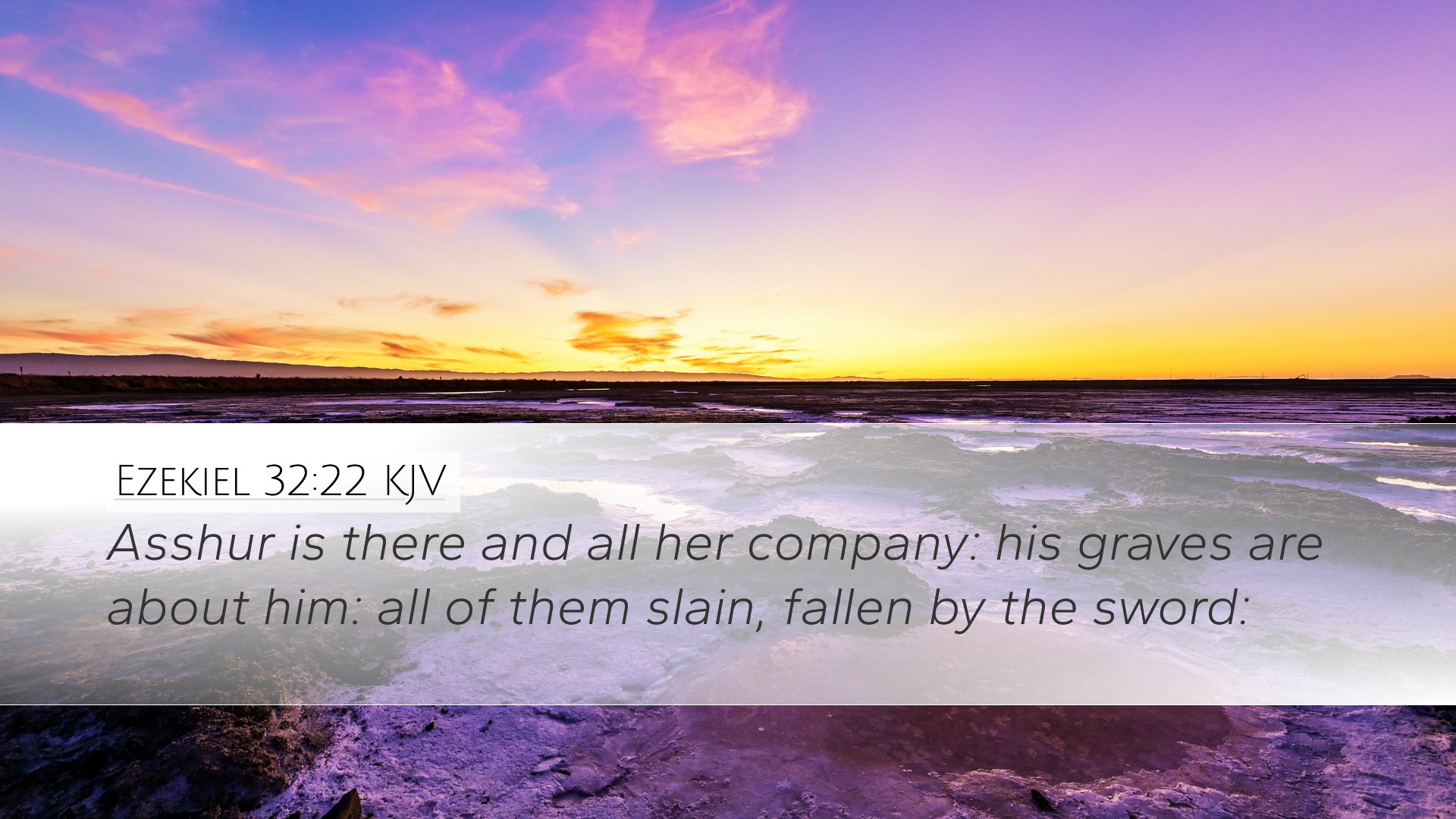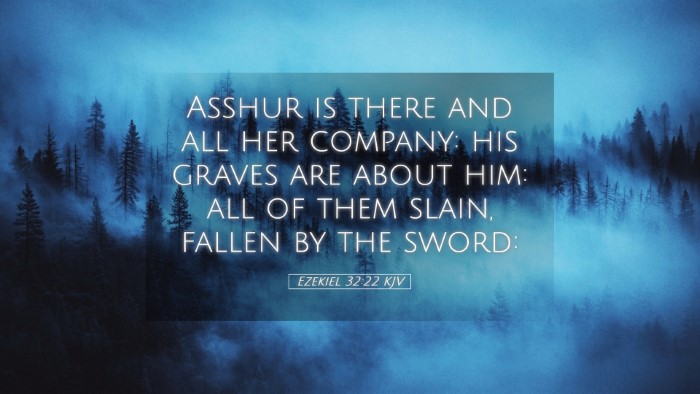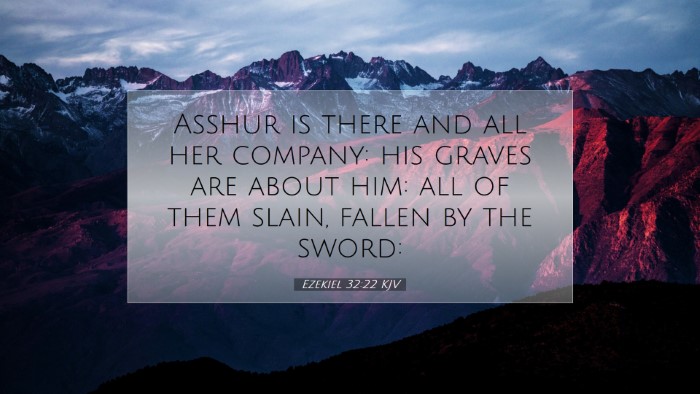Commentary on Ezekiel 32:22
Ezekiel 32:22 reads:
"Asshur is there and all her company: his graves are about him: all slain, fallen by the sword."
This verse is a part of a larger prophecy concerning the fate of Egypt and its allies, as foretold by the prophet Ezekiel. The imagery conveyed in this passage deeply illustrates the themes of judgment and mortality that are essential to Ezekiel's prophetic ministry.
Contextual Background
The prophet Ezekiel, during his ministry, addressed a people in exile, grappling with questions of identity, hope, and divine justice. His messages contained both warnings and assurances. In this chapter, Ezekiel likens the downfall of Egypt to the demise of a number of their leaders and allies, particularly the Assyrians, who had established their power but ultimately faced judgment.
Asshur's Identification
Asshur refers to the ancient empire centered in what is now northern Iraq. Known for its militaristic society and conquests, Assyria had considerable influence over the surrounding nations, including Egypt. This biblical reference serves to remind the Israelites of the fate of the once-mighty Assyrian empire, now reduced to the grave.
Commentary Insights
Matthew Henry's Commentary
Matthew Henry emphasizes the significance of the graves being "about him" as a representation of death's finality. He notes that Asshur, once a dominant power, now offers a stark contrast against God's judgment. The imagery invokes a deep sense of desolation: the graves surrounding Asshur symbolize the end of power, victory, and life amidst the celebrated might of the empire.
Albert Barnes' Notes
In his commentary, Albert Barnes observes that the presence of "all slain, fallen by the sword" illustrates the consequences of moral decay and rebellion against God. Barnes elaborates that in the context of divine judgment, even the mightiest are not exempt from the consequences of their actions. He asserts that the verse indicates a warning to other nations, particularly Egypt, prompting them to reflect on their own paths of idolatry and sin that may lead to a similar fate.
Adam Clarke's Insights
Adam Clarke highlights the poetic nature of Ezekiel’s denunciation of Egypt and its allies. He points out that referencing Asshur not only underscores the interconnectedness of these nations in sin but also serves as a grave reminder of shared destiny in downfall. Clarke elucidates that the repetition of such imagery is meant to resonate with the audience, emphasizing the inevitability of divine justice.
Theological Implications
The inclusion of Asshur's demise carries profound theological implications. It serves as a narrative arc demonstrating God's sovereignty in history, showcasing that nations and empires rise under divine allowance, yet fall under divine judgment. This theme resonates throughout the prophetic literature, underscoring the moral order established by God, which nations are bound to respect.
Judgment and Justice
Judgment in Isaiah, Jeremiah, and here in Ezekiel speaks to the righteous administration of justice by God. Each fallen empire serves as a prototype for the eventual fate of all who defy divine authority. For contemporary readers, this serves as a sobering reminder of the transient nature of human power against the eternal sovereignty of God.
Encouragement for Believers
While judgments are pronounced, the assurance of God's ultimate control provides comfort. Believers are reminded that despite the chaos of their circumstances, God’s purposes are being fulfilled. The grim reality depicted in Ezekiel 32:22 invites reflection on collective and individual righteousness and the call to uphold justice in the world.
Applications for Today's Church
This passage speaks to the church today by inviting introspection on how it fits within the narrative of divine justice. It calls leaders and congregants alike to examine their practices and ideologies. Are they walking in alignment with God’s statutes, or are they at risk of the same fate as Asshur and its allies?
Call to Righteousness
Scholars and church leaders can use this passage to enforce the imperative of living righteously. The example of Asshur should spur a serious dialogue regarding societal values and church practices that do not align with God’s teachings. The community is encouraged to avoid complacency and to address the systemic issues that may lead them towards judgment.
Role of Prophecy Today
Finally, the prophetic messages embedded in Ezekiel’s pronouncements continue to resonate in contemporary society. The church is tasked with being a prophetic voice that warns against injustice, moral decay, and the dangers of turning away from God. The message of repentance and the call to a return to holiness are as relevant today as they ever were.
Conclusion
Ezekiel 32:22 serves as a rich tapestry interweaving themes of judgment, divine sovereignty, and the call to righteousness. Insights from public domain commentaries illuminate the weight of this scripture, revealing its applicability to both ancient and modern contexts. As theologians, pastors, and students delve into this verse, they uncover the profound truths that challenge and provoke the church to remain steadfast in faithfulness to God.


